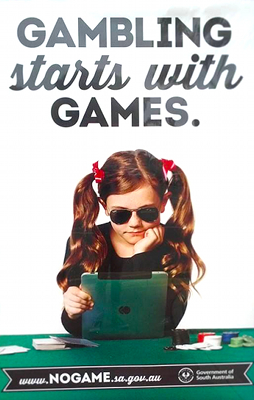 An Australian public service campaign warning parents of the alleged link between social gaming and real-money gambling is ruffling feathers down under. The Interactive Games & Entertainment Association (IGEA) is demanding the South Australian government take down billboard ads bearing images of a young girl holding an iPad, seated at a green-felt table on which rest playing cards and casino chips, all accompanied by type declaring “GAMBLING starts with GAMES.”
An Australian public service campaign warning parents of the alleged link between social gaming and real-money gambling is ruffling feathers down under. The Interactive Games & Entertainment Association (IGEA) is demanding the South Australian government take down billboard ads bearing images of a young girl holding an iPad, seated at a green-felt table on which rest playing cards and casino chips, all accompanied by type declaring “GAMBLING starts with GAMES.”
The ads direct parents to the government’s “Gambling is no Game” website, which warns parents that “children as young as three” are using technology to go online and play games, including those that “simulate gambling.” Such games “give children the opportunity to practice gambling” and make gambling “seem like part of normal everyday life.” These simulated gambling games “blur the line” between predominantly chance-based gambling and skill-based video games, which “can make children think they are skilled at gambling.”
The site acknowledges that existing research “has not demonstrated that engaging in simulated gambling causes someone to be a problem gambler,” but unidentified experts believe there is “evidence of a link between exposure of some children to simulated gambling and the development of problem gambling in adulthood.” [Emphasis added.] The site helpfully suggests parents not give kids their credit card details to avoid letting Little Suzie blow her college fund by foolishly taking another card on 17.
IGEA ISSUES DEMANDS
Since the billboard appeared a week ago, IGEA CEO Ron Curry has written a letter to the government demanding the ads be taken down based on their “inaccurate and unsubstantiated” representations. Curry cites South Australia’s Marketing Communications and Advertising Guidelines, which requires “all statements, claims and arguments included in the communication are able to be substantiated.”
Curry notes that the study listed on the government’s own website “does not suggest that simulated gambling precedes or follows monetary gambling.” Curry points out that anyone who viewed the billboard might arrive at the completely opposite conclusion and therefore the ad is “likely to trigger unwarranted concerns amongst millions of game playing Australian families.” Curry wants the ads taken down by Dec. 20 and expects future government claims “to be more responsible and focused on the issue at hand with statements that can be substantiated with evidence.”
THE ‘MOTHER’S MILK IS A GATEWAY TO ROTGUT WHISKEY’ ARGUMENT
South Australia has taken the lead amongst Aussie states in stamping out the gambling scourge wherever it rears its ugly, pustule-encrusted head, but this anti-gaming site – however well intentioned – truly takes the biscuit. Its suggestion that simulated gambling games are designed to “attract children with a catchy tune and cartoon-like animations” might be a valid point were it not for the fact that the Kitty Glitter social slots game was the second-most popular title among social gamers between 50 and 59 years old, suggesting that any childlike graphics are directed at those who only think young.
It remains to be seen whether South Australia will comply with the IGEA’s request or leave the billboards in place. As the calendar counts down to Dec. 20, one can only hope for future government campaigns stressing the irrefutable fact that the overwhelming majority of alcoholics began their wayward ways swilling milk, infant formula or a corrupting cocktail of both. Or that virtually all of the Wall Street wizards responsible for the 2008 global economic meltdown cut their financial teeth playing Monopoly. Honestly, how those infernal Parker Brothers get themselves to sleep at night is anyone’s guess.
